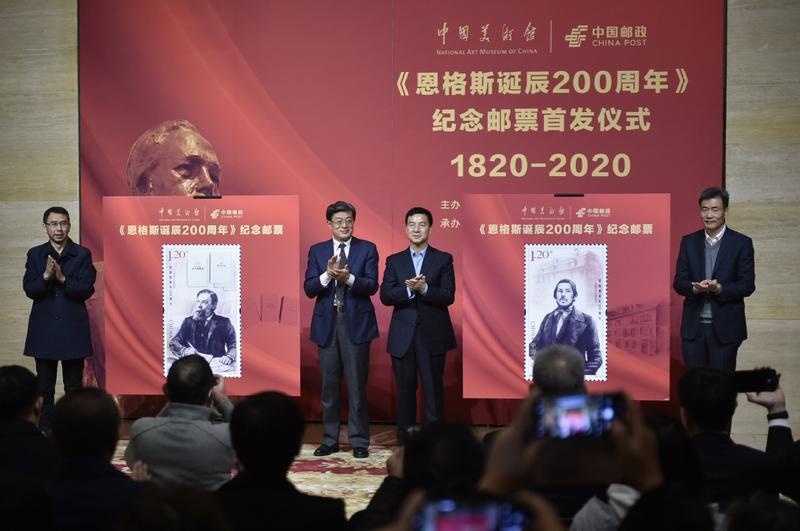 This photo shows the launch event for commemorative stamps marking the 200th anniversary of Friedrich Engels' birth anniversary in Beijing on Nov 28, 2020. Celebrations were also held across Europe. (LU PENG / XINHUA)
This photo shows the launch event for commemorative stamps marking the 200th anniversary of Friedrich Engels' birth anniversary in Beijing on Nov 28, 2020. Celebrations were also held across Europe. (LU PENG / XINHUA)
LONDON / BERLIN-Despite the raging coronavirus pandemic, Friedrich Engels' 200th birth anniversary, which fell on Saturday, was celebrated mostly online in various countries in Europe.
We do not see him (Engels) as a historical person that after his death we have nothing to talk about. Actually there are lots of ideas and thoughts that we should grasp even though we are in the 21st century.
Lars Bluma, scholar at the Historic Center of Wuppertal
In the western German town of Wuppertal, Engels' birthplace, a community festival as well as concerts, exhibitions, tours and discussions were planned in what was known as "The Year of Engels."
Due to the extended restrictive measures amid a surge in COVID-19 cases, most public events commemorating his birth were moved online.
Wuppertal's central library launched an exhibition named "Mensch Engels" (Human Engels) on its main webpage, displaying Engels' personality and his achievements.
The online exhibition showcased the legacies of Engels, including pictures, sketches and manuscripts to commemorate the great thinker.
ALSO READ: Guides explain Communist Manifesto
A new documentary Friedrich Engels-The Underestimated has been aired on local television a week before Engels' birthday.
The film referred to Engels and Karl Marx as "one of the most famous duos in world history," focusing on their lives and their efforts to develop Marxist theories.
A series of themed readings, lectures and discussions are planned in the coming weeks, probably being shown online depending on the pandemic situation.
Lars Bluma, a scholar at the Historic Center of Wuppertal, said the city had labeled 2020 as "the Year of Engels," and planned over 100 activities. Posters featuring a young spirited Engels, renowned as "a thinker, a doer and a Wuppertaler," are seen across the city.
'Beyond its time'
Calling Engels "the most famous son of the city," Bluma said Engels is still remembered because his thoughts are "beyond its time".
"We do not see him as a historical person that after his death we have nothing to talk about. Actually there are lots of ideas and thoughts that we should grasp even though we are in the 21st century," said Bluma.
In Manchester, Britain, an online event organized by the Chinese Consulate General in Manchester was held on Thursday to mark Engels'200th birthday.
The event saw a reproduction of the scene on Engels' 70th birthday, including performances of a piece of Beethoven's music, a segment of the opera La Dame aux Camelias and recitation of a poem by Russian poet Alexander Pushkin.
It also included a playback of the recent unveiling of the "Friedrich Engels Room" in Chetham's School of Music in Manchester and the premiere of a documentary about Engels' life in Manchester.
During the online event attended by more than 300 people, representatives from the Chinese consulate general and Chinese businesses and students in Britain were seen laying wreaths in front of the Engels statue in Manchester.
Richard Leese, deputy mayor of Manchester, said Engels' research in Manchester on social issues laid a solid foundation for the publication of The Communist Manifesto in late February 1848.
On the occasion of his 200th birth anniversary, Leese said Manchester is ready to advance its cooperation with China in a bid to pursue an inclusive and sustainable recovery from the pandemic.
READ MORE: World Congress on Marxism opens in China
Earlier last week, to commemorate Engels' birth, China's National Academy of Governance and Manchester City Council held an online seminar about industrial restructuring and economic recovery of cities.
Representatives from both sides discussed such issues as industrial restructuring, innovation and sustainable development.
In the autumn of 1842, Engels moved to Manchester, which was then known as "Cottonopolis" and started working for his family's textile business. In Engels' "second hometown", Engels and Marx started to develop groundbreaking theories that changed the course of history.


